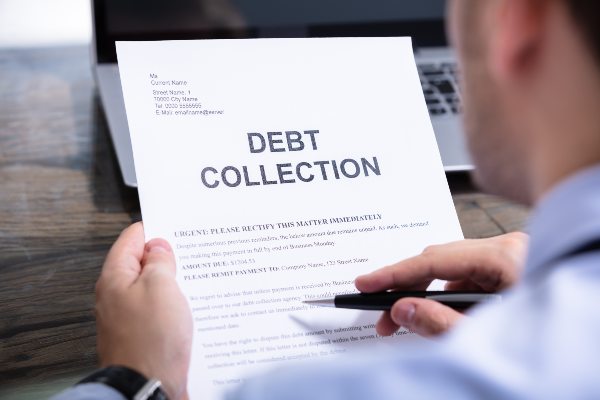Being in debt is an unfortunate circumstance in anyone's lives. However, it can be made worse when a representative of a debt collection agency is harassing you over the phone, mail, in person or via social media accounts. While you have an obligation to pay your debts, you also have rights. Being subject to any form of unfair debt collection practice is against your constitutional rights as a US citizen. We encourage you to contact a debt collector abuse attorney at VG Law Firm as soon as possible to regain your dignity and peace of mind.
In many cases, debt collection calls are pure scams. The perpetrators look for information on you online or even commit identity fraud. However, many people fall victim to this kind of practice. They may not be sure if they completely paid off their student loan, all the credit card fees, or utility bills. This is exactly what scammers rely on: your uncertainty concerning your actual debts and the lack of knowledge concerning debt collection law.

The first thing a debt collection agency should do is inform you of your debt in writing. This notification must contain the following information:
If you are not sure that you owe money to any company, state agency or individual, you must send the dispute letter on time - within a month after the initial debt collector contact.
If you owe money directly to your bank, you may be able to negotiate a payment plan or a more favorable refinancing loan. Things are very different when your debt is transferred to a private debt collection agency. Their representatives are the most likely to engage in debt collector harassment attitudes. However, you must know your rights and stand up for them.
The main body of law that protects your rights as a debtor is the Fair Debt Collection Practices Act (FDCPA) enacted by the Federal Trade Commission in 1978. This law clearly stipulates what debt collectors can and cannot do when they attempt to get debtors to pay the amounts they owe. The most important stipulations of this federal law are also included in the Florida Statutes 559.72
The act makes reference to thee main categories of unacceptable practices:
We will examine each of these three categories in detail, because you need to know what kind of violation the collection agency is committing against you when you decide to take legal action against them.
Both the FDCPA and the Florida Statutes include the following abusive debt collection instances on the list of forbidden practices:
Each of these instances of abusive behavior is illegal and you have a right to find relief from it. If the procedures set up by the Federal Trade Commission are not sufficient to stop a third-party debt collector from harassing you, then you need to get legal representation and seek your justice in court.
Another type of debt collection abuse is making various statements that are not true or are intended to mislead you. Such instances are:
Even if they are less aggressive than instances of harassment, these instances also represent abusive debt collector behavior. For more information about false representation and misleading information, you can consult the Federal Trade Commission's FAQs for consumers. it contains useful details on all types of debt issues, including time-barred debt and ways of reporting a debt collection agency for abusive practice or other alleged violation of debt collection rules.
When a debt buyer acquires your outstanding debt, they are authorized to collect the amount specified in the original documents. However, your current creditor may engage in unfair practices, such as:

Whether you have a debt collector calling at an inconvenient time, calling at your workplace or too many times each day, you have the right to tell them to stop and federal and state laws give you several options for relief. Please note that none of these will make the debt go away. If it is legitimate debt, you still have an obligation to find ways of repaying it.
However, you also have the right to be at peace while you seek ways to repay your debts within a reasonable period of time. Thus, these are some ways in which you can stop creditor harassment:
The first thing you must do is send the collection agency a letter requesting them to stop calling you. You should send this letter by certified mail, with a prepaid return receipt. This is your proof for the future that the debt collectors received your written request.
According to the law, they must cease sending you communications by phone, mail, social media platform or any other method you specified. If you continue to be harassed, you can report the agency to the Federal Trade Commission.
If the calls do not stop, you should document each of them, including the abusive language and any false statement the debt collector makes. Ideally, you should have another person present next to you. You may be tempted to record these phone calls and used them as evidence of harassing practice in the collection of debt.
However, according to Florida Statutes 934.03, you may intercept oral, wire of electronic communications only if all parties agree to this. Thus, you must obtain the debt collector's agreement to record the call. If they do not give it, you are committing a crime.
After collecting sufficient evidence, you can report the abusive debt collection agency either to the Federal Trade Commission. The information you must provide in your report includes:
You have the right to live your life in peace, free of harassment and any undue influence that makes you worry and affects your physical and mental health. Being in debt is not a crime (unless we are talking about a delinquent debt), thus, you should not be treated as a criminal.
With the assistance of en experienced debt collector abuse attorney in Fort Lauderdale, FL, you can successfully sue collectors who use profane language, threats or who humiliate you at your workplace or in front of your friends, neighbors and family members.
While you have the obligation to pay back your debts, you also have the right to receive compensation for harassment.
A collection defense attorney at VG Law Firm will examine all the evidence and explain your legal rights. The FDCPA stipulates a maximum amount of $1,000 under the strict liability rule (you do not have to prove the existence of fault). If you received robocalls (pre-recorded, automated phone calls), you are eligible to receive up to $1,500 per call according to the Telephone Consumer Protection Act.
You may also receive damages for your monetary losses, which include:

An experienced debt collector abuse lawyer at VG Law will fight for your rights. You do not have to worry about our fees, because the debt collection agency will also have to cover them when the case is over in your favor. Do not let abusive and harassing behavior ruin your life. Call us now: 833-HELP-365!
Meta description: Find out how a debt collector abuse attorney can help you fight harassment by phone or other means of communication by scammers and dishonest debt collection agencies.